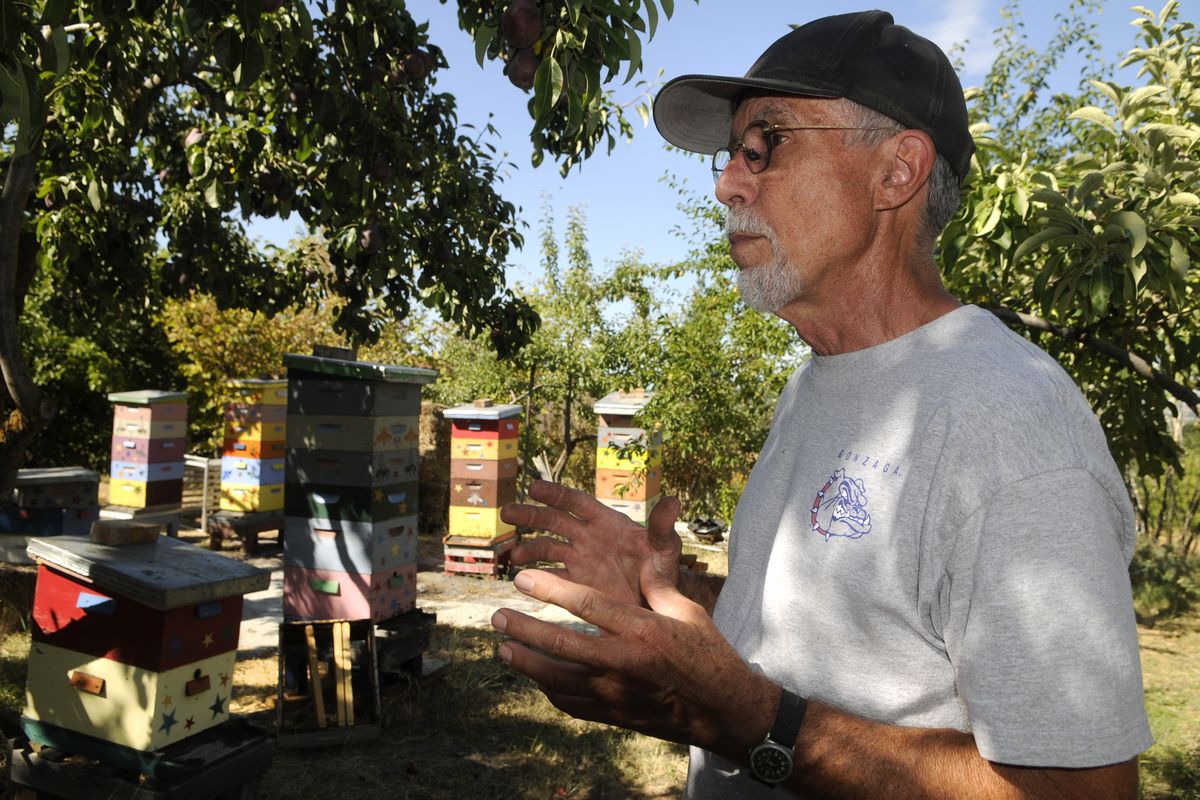To local man, benefits of bees abound
Bees teach, feed and rarely sting, apiarist says

Bees, not yellow jackets, but hardworking humble honeybees, used to be taken for granted.
Until a couple of decades ago, farmers and gardeners simply planted their crop and assumed bees would show up and pollinate everything. Bees were just around, buzzing here and there, and unless you were in the honey-making business you probably never thought much about them.
Bees have been part of civilization for thousands of years but only have been getting serious attention in recent years because colonies are dying from colony collapse disorder, killer bees are attacking, and bee habitat has declined. It turned out it wasn’t at all easy being a bee and taking bees for granted was no longer an option.
“Bees pollinate about 80 percent of what we eat,” said Spokane beekeeper Lars Neises. “So yes, the world could probably continue without bees, but we would have to rely on crops that are mostly wind pollinated. It would be very different.”
One of the latest trends is urban beekeeping. And that’s urban as in New York City, where hives can be spotted on flat rooftops and in neighborhood parks. In Los Angeles, community groups are working on once again legalizing beekeeping, and in Seattle there’s an Urban Beekeeping Project which collects wayward swarms and tries to educate people about honeybees.
Neises has been keeping bees on his South Hill property for 10 years, only a short drive from downtown.
“I like the idea of urban beekeeping,” said Neises. “No matter how you look at it there are fewer places where bees can live and work than ever before. An urban setting is not impossible. And gardeners quickly discover that their gardens do better if they have a lot of bees around.”
Neises has six hives in his yard and the closest he’s gotten to actual downtown beekeeping was rescuing a swarm outside the Davenport Hotel’s Palm Court last year.
“They were right there on the corner of First and Lincoln,” said Neises, who received a call from a friend telling him about the swarm. “I am just really happy that the people at the hotel didn’t spray the swarm. They were so helpful.”
The swarm now lives happily in one of Neises hives, which has been decorated with a painted palm tree.
“Bees are very docile during swarming,” Neises said. “They are thinking of finding a new place to live. They are not thinking of attacking you.”
In many municipalities beekeeping was outlawed years ago because bees were considered a nuisance – people were afraid of getting stung.
“I guess I can understand that it can be intimidating looking at a hive knowing there are 40,000 bees in there and what if they all come out after me,” said Neises. “But they don’t. They are completely focused on hoarding nectar and pollen. Just don’t stand right in front of the hive. That confuses them and you could get stung.”
Honeybees sting only as a defense mechanism but die because the stinger is torn from their bodies.
In the city of Spokane it’s legal to keep one bee colony per 4,350 square feet of lot area and a maximum of eight colonies regardless of how big the property is. Beekeeping is also allowed in Spokane County and in Spokane Valley – but regulations and conditions vary depending on zoning.
Budding beekeepers should check with city or county officials before purchasing bees.
One huge benefit from increasing the number of local bees is that they may once again be able to handle all the pollination in an area without any outside help. Industrial beekeepers currently truck beehives with live colonies from one end of the country to another, pollinating almond orchards in California and cranberry bogs in the Northeast.
“Four or five years ago the bee guys in California lost so many colonies they flew bees in from Australia to pollinate the almonds,” said Neises.
A backyard or rooftop bee colony can be set up for about $200 – including bees.
And healthy bees are a renewable resource starting over every spring.
“Don’t go into beekeeping blind, take a class and figure out how to do it,” said Neises. “It’s great, especially when children are involved.”